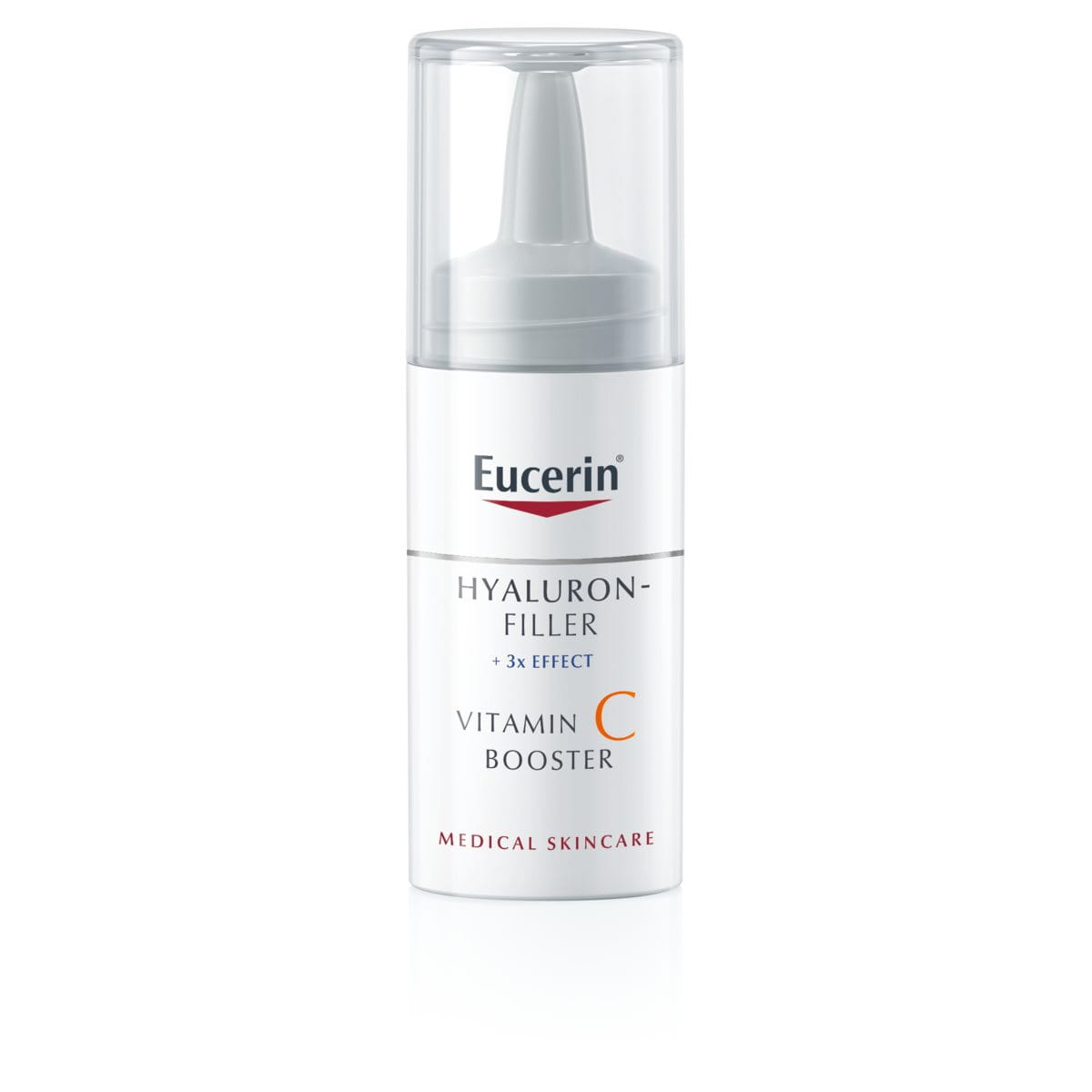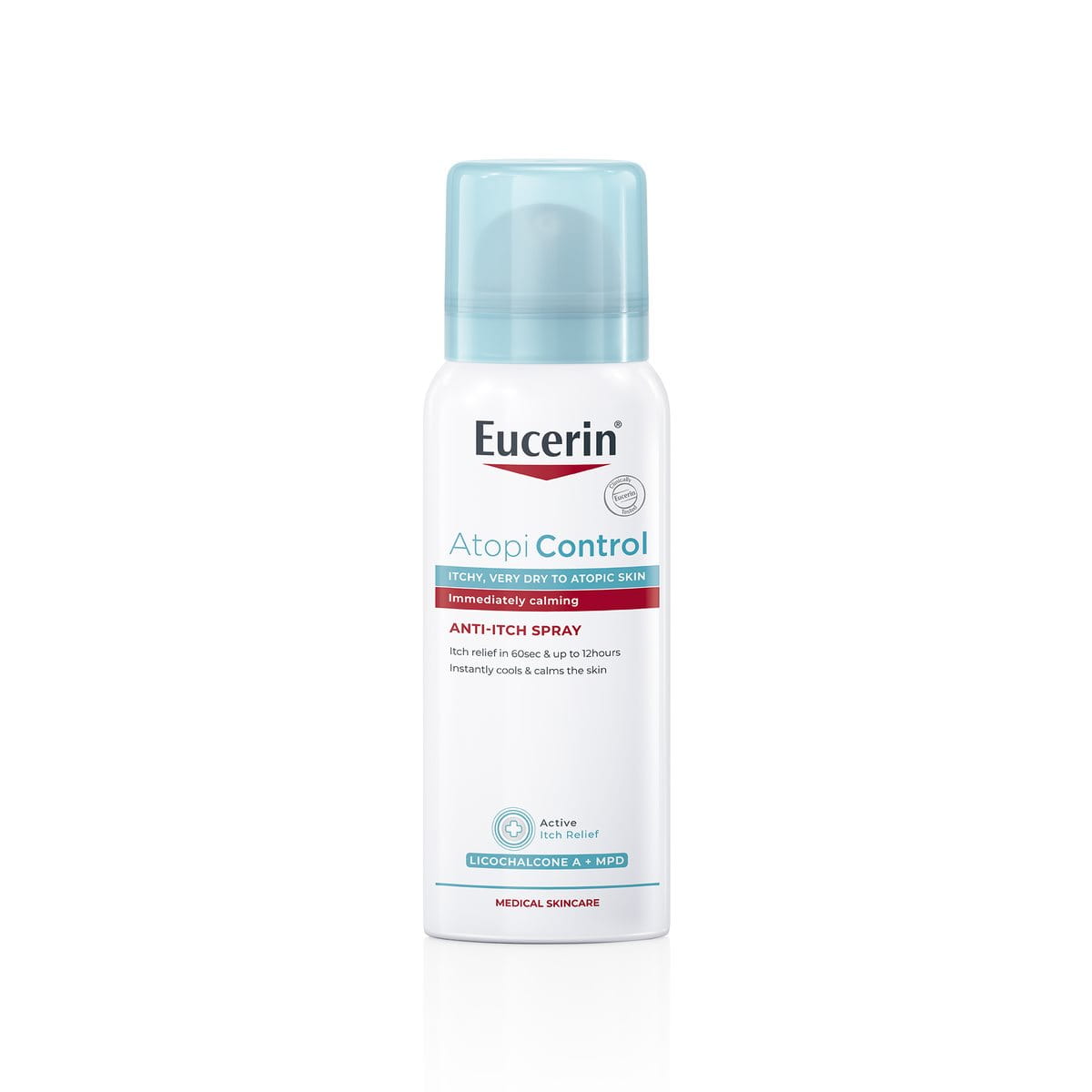Approximately 60% of all those with Atopic Dermatitis develop the disease in the first year of life, and 90% within their first five years1.
This article explains how to care for young atopic skin. We examine how gentle and regular skincare helps to keep young skin moisturised, prolonging the periods between flare-ups and reducing their severity. We also look at how to adjust your baby’s routine to suit the phase their skin is in. To find out about the symptoms, causes and triggers of the disease read Atopic Dermatitis in babies and children.
How should I care for my baby or child’s atopic skin?
Atopic Dermatitis (also known as Atopic Eczema) is typified by two phases:
- The acute phase when skin flares-up and is at its most irritable
- Calmer periods between flare-ups
You can read more about these two phases in Understanding Atopic Dermatitis and Identifying and managing flare-ups.
Your baby’s or child’s skin has slightly different needs at each of these stages and we recommend you adapt their routine to suit the phase and condition their skin is in. Broadly speaking this means:
- Daily care: Gentle cleansing and regular, effective and generous moisturisation to keep skin soft and supple and prolong the periods between flare-ups.
- Acute care: The use of anti-inflammatory ointments and creams (as well as some medically-supervised methods) in addition to normal daily moisturisation to soothe and calm skin during a flare-up.
Is there a daily routine that will help my infant’s Atopic Dermatitis?
Gentle cleansing
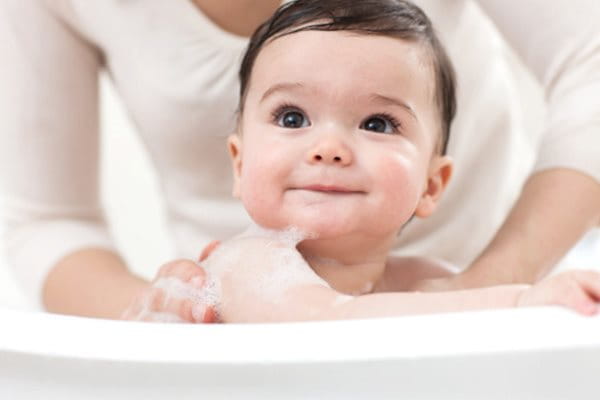
There is no known cure for Atopic Dermatitis so the focus of daily skincare should be on supporting skin’s protective barrier to prolong the period between flare-ups. Giving skin the moisture and lipids it needs to prevent further dryness will help to do this.
Bath time is an important bonding time for baby and parent, but even pure water can increase moisture loss2 so try to keep it quick and, when your child is old enough, encourage them to take showers instead of baths. And, because hot water causes further moisture loss, use warm water.
Harsh cleansers can also strip away essential lipids and damage the delicate protective barrier and moisture balance of young skin. Avoid bubble baths, alkaline soaps and harsh surfactants such as Sodium Lauryl Sulphate. Choose a mild, soap-free cleanser such as Eucerin AtopiControl Bath and Shower Oil. It makes an ideal additive for baby’s bath and is proven to be gentle on young atopic skin.
After bathing pat rather than rub skin dry with a clean, soft towel.
Regular moisturising
It’s important to moisturise your baby’s body immediately after cleansing to avoid further evaporation of water from their skin. But once a day is not sufficient − the effective management of atopic skin rests on the regular and continuous application of moisturisers (also known as emollients)2. We recommend that you moisturise your child’s body at least twice a day (even after an oil bath). Your child’s hands and face are likely to need more frequent care.

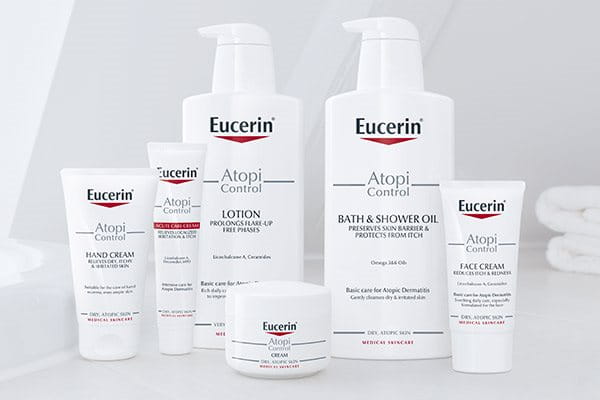
Look out for products that are fragrance-free and that contain proven but gentle actives such as:
- Licochalcone A: an extract of liquorice that soothes skin
- Ceramides: that strengthen skin’s natural protective barrier
- Natural oils rich in Omega fatty acids to soothe, nourish and protect delicate and dry skin
These ingredients are at the heart of the Eucerin AtopiControl range. Both Eucerin AtopiControl Cream and Eucerin AtopiControl Lotion are ideal daily moisturisers for babies and children over three months old. If your baby is less than three months ask your doctor for advice on what products you should use.
Eucerin AtopiControl Lotion is a rich lotion that is easy to apply all over your child’s body while still delivering the intense moisturisation they need. Eucerin AtopiControl Cream is ideally suited for individual problem areas such as the elbow folds and knee cavities. Take time to massage the products into your baby’s skin with gentle and calming stroking movements. It’s never a good idea to rush the process as that can stress your baby and may exacerbate symptoms.
Attention Box
Sun protection
Avoid exposing your baby to the sun, especially during the first few months. When they are three months or older be sure to limit exposure, avoid the peak hours when sun is at its most intense, use protective clothing to shield your child’s delicate skin and use a very high sun protection factor such as Eucerin Kids Sun Lotion Sensitive Protect SPF 50+. Alternatively, if you prefer a chemical-free sunscreen, try Eucerin Kids Mineral Sun Lotion Sensitive Protect SPF 30. Both are suitable for babies and children from three months.
When you child is three years or older try Eucerin Kids Sun Fluid Sensitive Protect SPF 50+ or Eucerin Kids Sun Spray Sensitive Protect SPF 50+. Both products are clinically and dermatologically proven to be suitable for children with atopic skin.
You can read more about how to care for young skin in the sun in children and the sun.
How can I calm my baby’s skin during a flare-up of Atopic Dermatitis?
The focus of skincare during the acute phase of Atopic Dermatitis is to calm skin, soothe irritation and itchiness and relieve discomfort for your child. Thankfully, there are a number of measures that can help:
Pharmaceutical products and treatments
Ointments and creams such as corticosteroids (e.g. a 1% hydrocortisone cream) offer fast-acting and effective relief, but are normally prescribed for short-term use only.
- antihistamines to reduce severe itching
- wet wrap therapy
Attention Box
Wet wrap therapy
Lipid-enriching bandages help to replace essential skin lipids and reduce itching by cooling your child’s skin. Check with your doctor before trying wet wrap therapy to ensure it is the right treatment for your infant:
- Apply a soothing moisturizer for atopic skin
- Soak a tube bandage in lukewarm water, wring it out and apply it to the affected area while still damp
- Cover the damp bandage with another dry one to keep it in place
- Leave the bandages on for at least an hour and ideally four to six hours
- Remoisten after three hours
Because babies are at risk from hypothermia, alternate the bandage between the torso, arms and legs.
Skincare products with soothing and calming ingredients
There are a number of active ingredients proven to soothe and calm skin during a flare-up:
- Licochalcone A: an extract of liquorice that reduces inflammation and soothes irritation
- Decanediol: a powerful anti-oxidant that works against bacteria to prevent infection
- Menthoxypropandiol: a menthol-derivative that cools skin and reduces itchiness at a sensory level so your child doesn’t feel the need to scratch so much and further skin damage is avoided.
Licochalcone A, Decanediol and Menthoxypropandiol are all part of the Eucerin AtopiControl Acute Care Cream formula which is suitable for use on babies and children over three months. Eucerin AtopiControl Acute Care Cream is not a medical product, nor is it intended to replace one, but it can be used as an adjunctive care product alongside medical treatment to support the benefits of the medical product.
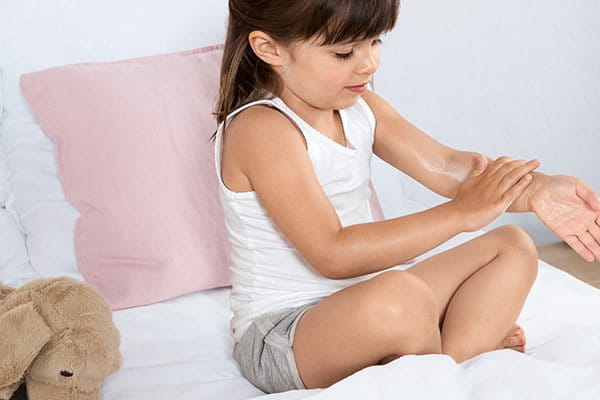
Apply your child’s medicated product first and allow it to absorb fully before applying Eucerin AtopiControl Acute Care Cream. Follow with Eucerin AtopiControl Lotion.
Clinical and dermatological studies show that Eucerin AtopiControl Acute Care Cream followed by Eucerin AtopiControl Lotion improve skin condition, relieve itching, support a good night’s sleep and improve overall quality of life3. You can read more in How Atopic Dermatitis affects sleep and quality of life.
What else can I do to alleviate symptoms?
In addition to gentle and effective skincare, working out any potential triggers and helping your child to avoid them can help to prolong the periods between flare-ups and reduce the severity of those flare-ups when they do occur. You can find out more about the steps you can take in Atopic Dermatitis in babies and children.
Sources
- Overview of Atopic Dermatitis, Avena-Woods C, Am J Manag Care, 2017 June, Vol. 23, No. 8, Supplement S115-123
- Handbook of Atopic Eczema. M. Kerscher & S. Williams. Springer 2006
- When used alongside Eucerin AtopiControl Lotion. Source: Beiersdorf research, AtopiControl PiU claim support, May 2017
Our brand values

We deliver a holistic dermo-cosmetic approach to protect your skin, keep it healthy and radiant.

We work together with leading dermatologist and pharmacist partners around the world to create innovative and effective skincare products they can trust and recommend.

For over 100 years, we have dedicated ourselves to researching and innovating in the field of skin science. We believe in creating active ingredients and soothing formulas with high tolerability that work to help you live your life better each day.


